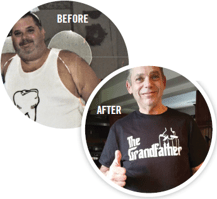Thanks to bariatric surgery and self-discipline, one patient has managed to keep 165 pounds off for 14 years.

John Vingara, 57, had always struggled with his weight. Growing up, he always had second helpings of food at meals, and he’s a chef (he taught in a vocational school and ran a catering business). By the time he was in his 40s, John, who is 5’5, weighed around 320 pounds and had developed diabetes, sleep apnea, and multiple hernias.
“I thought, if I want to see my daughter get married and have grandkids, I need to address this,” recalls the Raritan resident.
John learned that a fellow teacher had lost weight after having bariatric surgery at Robert Wood Johnson University Hospital (RWJUH) Somerset.
“You should give it a try,” his colleague said.
John saw his primary care provider and asked about the procedure, but his doctor wasn’t enthusiastic.
“You realize you’ll never be able to eat Thanksgiving dinner again,” he said. “And you’ll have to take vitamins for the rest of your life.”
John wasn’t deterred.
“I knew what I was getting myself into,” he recalls. “I said, ‘If I don’t do anything, I might develop heart disease or have a stroke. I’ll take my chances.’”
A New Way of Eating

In the fall of 2005, John saw David Ward, MD, the RWJUH Somerset bariatric surgeon who had operated on his friend.
Dr. Ward recommended the gastric bypass procedure, in which the stomach is divided into two sections. The top part becomes a small pouch the size of a walnut, limiting the amount of food that can be eaten and is connected to the middle of the small intestine. The remaining parts of the stomach and intestinal tract don’t absorb food.
The procedure leads to hormonal changes that reduce appetite, and it works especially well for people with diabetes.
“The procedure has a metabolic effect,” says Dr. Ward. “Insulin (a hormone that regulates blood sugar) becomes more effective, and blood sugar levels go down.”
John told Dr. Ward that he couldn’t have the procedure until August due to his teaching schedule. Over the next nine months, he saw a nutritionist in Dr. Ward’s office.
“Patients learn to count calories and weigh their foods,” says Dr. Ward. “Those who lose weight before they have surgery do the best afterward.”
In August 2006, John had the procedure at RWJUH Somerset. He spent several days in the hospital and recovered over the course of two weeks.
“I started out with a liquid diet, and then I began to eat small pieces of chicken and drink protein shakes,” he says. “I always made sure I ate protein at the start of every meal.”
Today, John limits starches, control portion sizes and stay away from soda. “I eat around 25 percent of the amount of food I used to eat,” he says.
A Successful Outcome

John lost an impressive 165 pounds in the first year after his surgery, and he’s managed to keep it off for 14 years. His sleep apnea and diabetes have disappeared. At 155 pounds, John was happy to learn that he fit into the “ super preferred category” for his life insurance policy.
“John is very motivated because he was miserable before the surgery,” says Dr. Ward. “He fears regaining the weight and going back to the way he was. He knew the surgery was a lifelong commitment.”
Today, John enjoys teaching classes on food safety for the restaurant industry, working for an entertainment company, and playing with his 4-year-old grandson, Tyler. “He’s one of the greatest parts of my life,” says John.
Debunking Popular Diet Myths
MYTH: A few extra pounds won’t hurt me.
Not only can obesity and diabetes lead to a host of health problems and premature death, but they’re also known to increase the chances of dying from COVID-19 by tenfold, says David Ward, MD, a bariatric surgeon at Robert Wood Johnson University Hospital Somerset.
MYTH: I can easily lose weight through diet and exercise.
While it’s possible to lose weight through diet and exercise, surgery is far more effective for people who are obese. “Two out of 100 people will lose weight and keep it off through diet and exercise, and 70 out of 100 will do it with bariatric surgery,” says Dr. Ward.
MYTH: If I gain weight, I’ll just go on a diet.
If you gain a few extra pounds and keep them on for a year, you’ll have a tough time shedding them. “Your body’s ‘set point’—the weight it recognizes as ‘normal’—will ‘reset,’ and your body will try to hang on to those extra pounds,” says Dr. Ward. Try to lose any extra weight as quickly as possible.
MYTH: People gain weight when they’re older because their metabolism slows.
Actually, it’s more of a lifestyle issue, says Dr. Ward. “When people’s kids grow up, they have more time to eat,” he points out. “They also might eat out more.” In addition, some older people become sedentary, so it’s important to stay active.
Could You Benefit from Bariatric Surgery?
If you’ve been unsuccessful at slimming down, weight-loss surgery may help to improve your health and quality of life. Join bariatric surgeons at Robert Wood Johnson University Hospital Somerset for free online seminars to learn about your options, including gastric banding, sleeve gastrectomy, and gastric bypass. Upon registering, you will receive an email with all log-in information.
Learn more about weight loss and bariatric surgery at RWJUH Somerset.